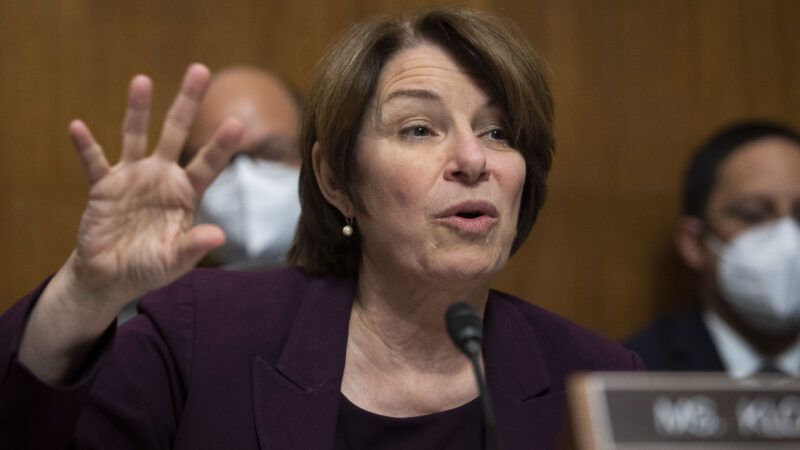Klobuchar's Media Bill Won't Save the Press
It'll just lend a hand to the outlets the senator prefers.

Sen. Amy Klobuchar (D–Minn.) likes to paint herself as a 21st century trustbuster. However, her latest antitrust proposal, the Journalism Competition and Preservation Act (JCPA), is pro-collusion and provides an antitrust exemption for politically well-connected news media companies.
What this bill reveals is that the heart of the antitrust crusade by Klobuchar and other neo-Brandeisians is not actually about consumer protection or small businesses. They seek to use antitrust and the force of the government to protect the companies and industries they prefer.
The JCPA pits digital platforms like Facebook and Google against "traditional" media services such as newspapers. To "help" these traditional media companies against the supposedly big, bad tech companies, the JCPA mandates that platforms pay news publishers to link to their articles, creates an artificial limit discouraging news platforms from expanding their newsrooms' reach to reap the law's benefits, and creates an eight-year safe harbor from existing antitrust laws including allowing news companies to collude with one another. In short, this proposal empowers the government to help out its favored, eligible news services while also attacking today's successful tech companies. The real losers, however, are the American people.
The media plays an important role in public discourse, and one incredible benefit of the internet is the ability to access both hyperlocal information and news sources from around the world. For the average consumer, this means access to more sources of information and different voices than ever before. No longer is it just a matter of what makes the morning edition of a few newspapers, but instead, we can see what is happening on the other side of the world and read commentary from new perspectives.
It has allowed us to stay connected to what's going on back home even when we're far away and unable to get our favorite local news sources in print. For example, a beloved local pub in Arlington, Virginia, recently caught fire after a car crashed into it. Like many familiar with Ireland's Four Courts, I rushed online to see what had happened. Initially, the first reports of the incident came from bystander tweets of a local news site. Much to my and others' benefit, social platforms enable the quick sharing of this information rather than having to physically go find it, or worse, wait until the evening news or the next day's local or national paper decides to run it (or not).
But laws like the JCPA could make it more difficult and costly for platforms to provide access and allow users to share this sort of information from small, local news sources. Consumers might end up facing additional paywalls as online platforms will have to pay for sharing news.
Looking into the media industry itself, it's no secret that Americans increasingly distrust legacy news organizations. According to a recent Gallup poll, trust in the media has crashed over the past 30 years. But the press as an idea is still seen as very important to democracy.
As such, Americans and people globally still rely on local and niche news sources to obtain information that may not be important to others. But today, consumers are getting that information from more and different forms than ever before. Not only do we have traditional newspapers, TV, and radio channels, but we also have new types of media emerging, such as podcasts, apps, videos, blogs, and newsletters.
This dynamism is increasing the reach of legacy and emerging outlets alike without the need for the government to step in. However, traditional media outlets seem to be worried about current sentiments against their industry, and they may be turning to the government to ensure they remain viable even if Americans reject them. It's a playbook seen in other instances of industries running to the government and begging it to make things "fair" when the competition heats up, rather than evolving with market demands. The result would likely be, as has happened before, that the government unfairly props up those who are least useful in a changing market by giving them special privileges.
But the potential damage that laws like the JCPA could do is not purely theoretical. We can look at the consequences Australia has faced in light of a similar law. Like the JCPA, Australia's Media Bargaining Code was portrayed as protecting journalism from its loss to social media. Its actual results remain murky at best, and the way it's designed favors certain media players like Rupert Murdoch's News Corp. Increasingly, it has been revealed that proposals like the JCPA are less about helping local news and more about crony capitalism.
Today's journalists face many serious challenges, including the pressure to conform rather than innovate and improve. But the JCPA would further fail today's independent journalists, decrease the amount of information available, and raise costs for consumers, small outlets, and online platforms.


Show Comments (105)